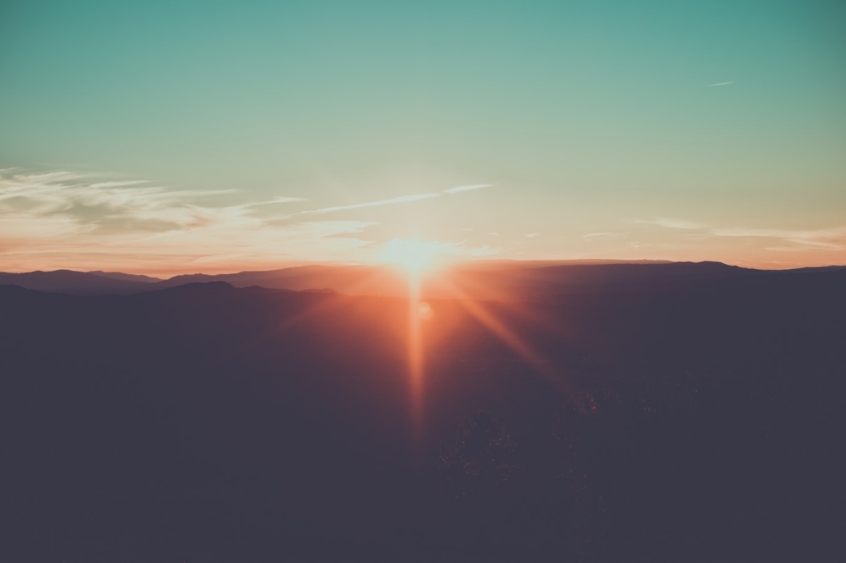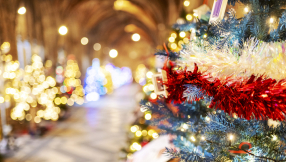
At this very troubling time for the whole world, when everyone of us is infected with a pestilence that we don't understand, and many of our leaders - religious, political and medical - appear to be falling like flies, what does this time of year mean to the Jewish people?
Tonight we celebrate the age-old Seder, which ushers in for the Jewish people at the beginning of spring, the start of our personal and historical, religious, communal and political liberation from slavery.
Judaism functions on many different levels - the seasonal, the personal, the historical, the religious, the communal and the political - but most of all, tonight of all nights, the historical. And all these aspects are included in the intergenerational Pesach Seder that we have celebrated for 2,000 years.
The preparations for this story-telling saga of our history are great - the cleaning of the house to rid it of chametz, the leaven flour and grain products which remind us of our egos. Instead, we eat matzah - the bread of affliction, which reminds us of our slavery in Egypt from which we are in the midst of being liberated.
Liberation from slavery is a gradual process, as exemplified by the history - for instance - of the American slaves and the Russian serfs in the 19th century. Things didn't always go to plan and often the newly-liberated were left floundering about, not quite sure what to do with their hard-won and often unexpected freedoms.
All this is encapsulated in the Seder, which of course also includes mention of the 10 'plagues' (actually translated as 'knocks') experienced by the Egyptians, when G-d gave them every chance in the world to 'let My people go' and they stubbornly refused. Eventually, therefore G-d 'hardened their hearts' so that, in fact, they would be unable to 'let go' and were stuck in their stubbornness as a lesson for us all.
The Seder is also a generational affair with the spotlight on the youngest child who asks and answers the question: 'Why is this night different from all other nights?'
Tonight, however, will be the first time in history that many Jewish people, instead of marking this time together, will be entirely alone and will have to 'play many parts', as Shakespeare says in 'As you Like it'.
For the first time in the history of the Jewish people, many of us will have to take on many different roles, becoming in turn 'the wise child', 'the wicked child', the 'simple child' and 'the child who doesn't know how to ask.' (If you don't know what I'm talking about, you can find out more about these roles here.)
They will also have to be the parent, the grandparent, Rabbi Gamliel, as well as the young goat of the final song 'Chad Gadyah' and G-d Himself, as no-one else will be there to play those parts for them.
In Israel itself, in case people sneak out to see their grandparents and in order to prevent danger to the lives of the oldest and most vulnerable, the government has now ordered a total lockdown for four entire days and nights, until Sunday morning.
Not even in the concentration camps will people have been so alone as many of them will be tonight and for the following four days.
But is it actually the case that we will be totally alone? For maybe we will learn tonight more than any other time that we actually are all in this together. Every single person in the world is now in danger of being afflicted by plague, just as the Egyptians were, and just as the Seder teaches us.
Life is not simply a game, nor a generational get-together, positive and comforting as these often are. Life also teaches us how to be resilient and cope on our own in often unexpected and shocking situations, as we have to right now.
It is no coincidence that the Hebrew word 'seder' means 'order', 'being OK', the 'Jewish prayer book' and also 'how to cope'. All these words and thoughts come from the coming together of three little Hebrew letters 's - d - r'.
As well as the matzah, we drink four cups of wine and lean on our sides in order to emulate, for once in our lives, the pampered rulers under whose dominance the Jewish people have had to live for much of our history. Reading from the Haggadah, our story book, we relate and re-live how we, the Jewish people, started out, became slaves, and then gradually rejoiced as G-d 'brought us out of Egypt'. We acknowledge our gratitude in the song 'Dayenu' for all the good things that G-d has done and will do for us in our history - each one of which would have been 'enough'.
Corresponding to the four children, the four questions and the four cups of wine are the four stages through which G-d delivered us, as stated in Exodus 6: 6-8.
Not only did G-d take us out from our burdens, but He also rescued us, redeemed us and took us to Himself as a people, leading us into the Promised Land which turned us into a nation ourselves and into a light to all the other nations on earth.
And as there is 'no before or after in Torah', the past becomes the present and also the future.
So the lesson that might be drawn from the present situation in which we, the whole world, are currently suffering with pestilence and all the fall-out this brings, is to see ourselves during this time as potential survivors, worthy of being redeemed - yes all 7.7 billion of the world's human creatures - and of being taken into G-d's arms as a worthy human nation.
Food for thought there, because the Pesach Seder, so often having to be celebrated in secret, has now become an invitation to the entire world: 'all those who are hungry, come and eat.'
It would be so easy to end in gloom but I prefer to end on a musical high. As such, I have thought long and hard about the way that all the 10 plagues could be attenuated by musical moments that have engaged my own life and will remind me of my parents and children and their own histories as I celebrate the Seder on my own tonight:
1) Blood (the sea turned red) - La Mer by Charles Trenet, my mother's favourite which I used to sing to her at the piano and which reminded her of Nice on the sea where French people saved her life in the Holocaust:
2) Frogs (which got into everything) - Brahms' Academic Overture, my father's favourite, which reminded him of his law studies at Warsaw University completed just before WWII when he had to escape:
3) Lice - the musical, 'South Pacific', by Jewish duo, Rodgers and Hammerstein, and especially apt, the song, 'I'm Gonna Wash that Man right out of my Hair', here by the incomparable Ella Fitzgerald:
4) A mixture of noxious beasts - no choice here, but the theme tune from the famous war film, 'The Dam Busters', also one of my father's favourites, which I used to sing to my first-born, Kalela, with made-up words of course!
5) Pestilence - Grieg's Holberg Suite, performed by the Welsh Chamber Orchestra, which I first heard played at the Nobel Peace Prize ceremony in Oslo, 1991 - and hadn't realised 'till then that such beauty existed, and then met all the lovely Welsh musicians afterwards - one of the high spots of my life:
6) Boils - Mozart's Jupiter Symphony - his last and the final movement. This piece could lance anything:
7) Hail - Chopin's Raindrop Prelude, composed in Majorca in a monastery that I have visited. I have played most of Chopin's oeuvre in my life and this would be a good pointer to remembering that despite the hail we may experience in our own lives, 'the quality of mercy droppeth as the gentle rain from heaven upon the place beneath' and 'this too will pass'.
8) Locusts - Bach's Preludes and Fugues for keyboard:
9) Darkness - a tangible depression - the theme tune from Schindler's List by John Williams, performed by Itzhak Perlman. After so many years, still we ask: how could humanity ever sink so low?
10) And finally the Slaying of the First-Born, 'Adon Olam' 'Lord of the Universe', that we sing often in the Jewish community and which reminds us that G-d is always there, caring about us even, and especially, in times when we don't always understand what is going on.
Enjoy:













